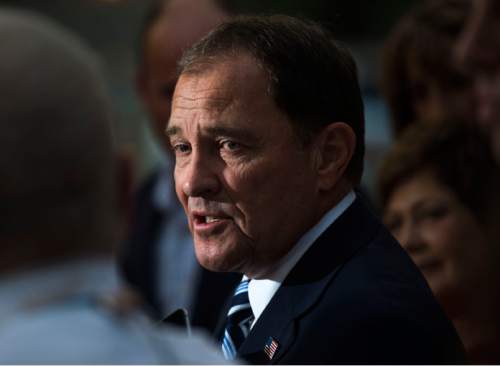This is an archived article that was published on sltrib.com in 2016, and information in the article may be outdated. It is provided only for personal research purposes and may not be reprinted.
Gov. Gary Herbert is calling lawmakers into a special session Wednesday to pass emergency legislation to punish drone pilots flying over wildfires, to spend $10 million to build a stadium at the Utah Fairpark and to offer tax incentives to try to lure a massive Facebook data center to Utah.
This past weekend, drone traffic hampered firefighting efforts on the Saddle Fire in southwestern Utah, grounding air tankers until the airspace was cleared to avoid collisions.
The Legislature passed a law making it illegal to fly in areas restricted due to firefighting efforts, but the legislation to be considered this week will stiffen the penalties and possibly allow the fire commander to take down drones in the area.
Rep. Don Ipson, R-St. George, who will sponsor the bill, said technology is available to jam the signal to drones and force them to crash.
"This summer, wildfires in the state have become significantly worse due to drones interrupting air operations," Herbert said in a statement. "It is dangerous and completely unacceptable, and this legislation takes steps to ensure that our emergency management personnel are safe and empowered to do their jobs effectively."
A measure passed earlier this year makes it a second-degree felony punishable by up to 15 years in prison if a drone causes a firefighting air tanker to crash, a third-degree felony if a drone collides with a firefighting aircraft, a class A misdemeanor if a drone keeps a tanker from dropping its retardant and a class B misdemeanor for operating a drone in a restricted area.
Once tankers are airborne, Ipson said, they cannot land filled with retardant, and they have had to drop their payloads away from the flames so they could land.
"We're going to enhance the penalties in hopes that we can discourage the use of unmanned aircraft around the aircraft that are trying to fight the fires," Ipson said. "As we go into the wildfire season, I want to give these guys the tools they need. They've had to pull these aircraft off because of the sightings of these [drones]."
In another special-session item, a bill, sponsored by Sen. Curt Bramble, R-Provo, seeks to extend a sales-tax break to data centers that might be interested in building in Utah — an apparent bid to lure a Facebook data center to the state.
Facebook has not publicly expressed interest in building a data center in Utah, but Rocky Mountain Power has filed documents before the Public Service Commission, seeking the approval of a contract with the social media giant to provide renewable energy to a potential new data center.
Bramble would not confirm that the tax incentive is being dangled in hopes of landing Facebook, but he acknowledged it would be the type of company that might qualify.
"It's [for] companies that need substantial data storage required for their own business model — a Facebook, a Twitter, Google or Microsoft," he said. "There are probably only a half-dozen to a dozen companies worldwide that would fit that."
Bramble said it's unclear how much Utah would be giving up in sales-tax revenue because there's no way to know how much companies might spend to build the facilities, but "if we don't do this, we're not going to get them."
A third bill for lawmakers to weigh would commit $10 million in state taxpayer dollars to build a $17 million, 10,000-seat stadium at the Utah State Fairpark in western Salt Lake City.
The venue would host the Days of '47 Rodeo and other events.
The Church of Jesus Christ of Latter-day Saints has offered to kick in $3 million. Salt Lake City and Salt Lake County, under the plan, would spend about $3 million on the project as well. Other money would come from private donors.
"The state fair is an important event for Utahns from every corner of our state, particularly residents of Salt Lake City's west side," Herbert said. "I appreciate the partnership between the state, local governments and the private sector to make this important facility possible."
Six other items are also on the special-session agenda:
• A bill allowing grandparents to go to court to seek visitation of a grandchild adopted by another family member. Herbert vetoed the measure earlier this year over concerns about the process for seeking the visitation, but he said he would approve it if changes were made.
• Legislation allowing Adult Probation and Parole officers to access a controlled-substance database for people on probation and parole without having to get a warrant.
• A bill aimed at protecting investments by patients at continuing-care facilities.
• Revisions to the Judicial Nominating Commissions process that would allow additional picks to be considered for judicial vacancies when more than one judge is being appointed simultaneously.
• Changes to some reporting requirements as part of the Justice Reinvestment Initiative, which was passed by the Legislature in 2015 and seeks to trim penalties for some crimes and focuses more on rehabilitating and reintegrating former inmates into society.
• Corrections to a bill designed to evaluate the effectiveness of tax credits the state gives to companies.
Twitter: @RobertGehrke



